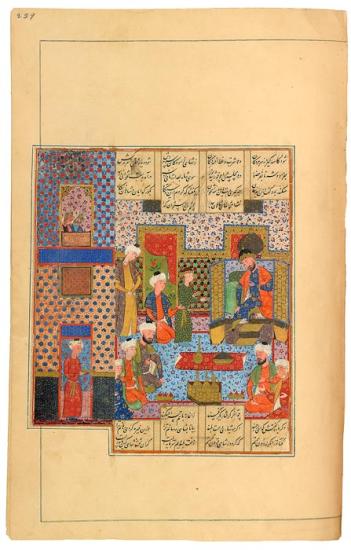
A Young Prince Holds His Father's Bones Before Iskandar
Haft aurang (Seven Thrones), in Persian, written by Ḥasan al-Ḥusainī
Purchased by Pierpont Morgan, 1911
The poet Jāmī's Haft aurang consists of seven romantic and didactic masnavīs (narrative poems in rhyming couplets), the last treating stories about the wisdom of Iskandar (Alexander the Great). Here Iskandar converses with a young prince whose region he recently conquered. The youth, the only surviving member of his royal family, shows Iskandar the bones of his father, the dead king, He hopes to demonstrate that the bones look no different than those of commoners and that conflict among men is senseless. Jāmī was one of the last great Sufi scholars and poets. The term Haft aurang also refers to the seven stars comprised by the Big Dipper (Ursa Major).
Persian poetry
The Persians loved their poetry and their poets, though the Qur˒an warned against believing their words (sura 69.41) and "those straying in evil who follow them" (sura 26.224). While Arabic was the first language of Islam and the language of the Qur˒an, Persian was favored by poets. Even Firdausī's (940–1020) celebrated Shāhnāma (Book of Kings), the national epic of Persian, was written in verse—some 50,000 couplets! Rūmī (1207–1273), the best known of the Sufi poets, put poetry in perspective when he wrote, "A hundred thousand books of poetry existed / Before the word of the illiterate [Prophet] they were put to shame!" (Masnavī I, 529). Presented here are illustrations of Firdausī's Shāhnāma as well as works by Sa˓ dī (ca.1184–1292), Hāfiz (ca. 1320–1389), and Jāmī (1414–1492), regarded as the last of the great Sufi poets. Also featured are illustrations from each of the five poems of the Khamsa (Quintet), by Niẓāmī (ca. 1141–1209), especially Lailā and Majnūn (The Persian Romeo and Juliet) and Bahrām Gūr's Seven Princesses.
